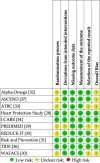Fragility of cardiovascular outcome trials (CVOTs) examining nutrition interventions among patients with diabetes mellitus: a systematic review of randomized controlled trials
- PMID: 36129664
- PMCID: PMC9712353
- DOI: 10.1007/s42000-022-00396-5
Fragility of cardiovascular outcome trials (CVOTs) examining nutrition interventions among patients with diabetes mellitus: a systematic review of randomized controlled trials
Abstract
Purpose: There is controversy regarding the optimal statistical method to interpret how robust is a statistically significant result. The fragility index (FI) and the reverse fragility index (RFI) are quantitative measures that can facilitate the appraisal of a clinical trial's robustness. This study was performed to evaluate the FI and RFI of randomized controlled trials (RCTs) examining nutritional interventions in patients with diabetes mellitus, focusing on cardiovascular outcomes.
Methods: A systematic search was conducted and relevant RCTs were identified in three databases. RCTs examining nutritional interventions (supplements or dietary patterns) in patients with DM with dichotomous primary endpoints involving cardiovascular outcomes were eligible. Data were extracted to compose 2 × 2 event tables and the FI and RFI were calculated for each comparison, using Fisher's exact test. Risk of bias (RoB) of the included RCTs was assessed with the Cochrane RoB 2.0 tool.
Results: A total of 14,315 records were screened and 10 RCTs were included in the analyses. The median FI of the paired comparisons was 3 (IQR: 2-4) and the median RFI was 8 (IQR: 4.5-17). RoB and heterogeneity were low.
Conclusions: RCTs examining nutritional interventions and cardiovascular outcomes among patients with diabetes mellitus appear to be statistically fragile. Τhe FI and the RFI can be reported and interpreted as an additional perspective of a trial's robustness.
Highlights: • In the evidence-healthcare era, assessing how robust statistically significant results are remains a matter of controversy. • Recently, the fragility index (FI) and reverse fragility index (RFI) were proposed to assess the robustness of randomized controlled trials (RCTs) with 2 × 2 comparisons. • When applying the FI and RFI, RCTs examining nutritional interventions and cardiovascular outcomes among patients with diabetes mellitus (DM) appear to be statistically fragile. • Τhe FI and the RFI can be reported and interpreted as an additional perspective of a trial's robustness. • RCTs implementing nutrition interventions among patients with DM can improve their methodology.
Keywords: Cardiovascular disease; Dietary supplements; Fragility quotient; Meta-epidemiology; RCT; Research methodology; Statistical robustness.
© 2022. The Author(s).
Conflict of interest statement
The authors declare no competing interests.
Figures



Similar articles
-
An analysis of randomized controlled trials on anal fistula conducted between 2000 and 2020 based on the Fragility Index and Reverse Fragility Index.Colorectal Dis. 2023 Aug;25(8):1572-1577. doi: 10.1111/codi.16645. Epub 2023 Jul 3. Colorectal Dis. 2023. PMID: 37400967 Review.
-
The fragility of statistical findings in the reverse total shoulder arthroplasty literature: a systematic review of randomized controlled trials.J Shoulder Elbow Surg. 2024 Jul;33(7):1650-1658. doi: 10.1016/j.jse.2023.12.005. Epub 2024 Jan 27. J Shoulder Elbow Surg. 2024. PMID: 38281679
-
Robustness of Longitudinal Safety and Efficacy After Paclitaxel-Based Endovascular Therapy for Treatment of Femoro-Popliteal Artery Occlusive Disease: An Updated Systematic Review and Meta-Analysis of Randomized Controlled Trials.Ann Vasc Surg. 2024 Apr;101:164-178. doi: 10.1016/j.avsg.2023.11.024. Epub 2023 Dec 26. Ann Vasc Surg. 2024. PMID: 38154491 Free PMC article.
-
The fragility and reverse fragility indices of proximal humerus fracture randomized controlled trials: a systematic review.Eur J Trauma Emerg Surg. 2022 Dec;48(6):4545-4552. doi: 10.1007/s00068-021-01684-2. Epub 2021 May 31. Eur J Trauma Emerg Surg. 2022. PMID: 34056677
-
The Statistical Fragility of Tranexamic Acid Use in the Orthopaedic Surgery Literature: A Systematic Review of Randomized Controlled Trials.J Am Acad Orthop Surg. 2024 Jun 1;32(11):508-515. doi: 10.5435/JAAOS-D-23-00503. Epub 2024 Apr 3. J Am Acad Orthop Surg. 2024. PMID: 38574390
Cited by
-
A Meta-Epidemiological Study of Positive Results in Clinical Nutrition Research: The Good, the Bad and the Ugly of Statistically Significant Findings.Nutrients. 2022 Dec 4;14(23):5164. doi: 10.3390/nu14235164. Nutrients. 2022. PMID: 36501193 Free PMC article.
-
Genetics of hyperaldosteronism and a wealth of new information on topics ranging from MEN1 to Cushing's disease and metabolic syndrome.Hormones (Athens). 2022 Dec;21(4):521-523. doi: 10.1007/s42000-022-00418-2. Hormones (Athens). 2022. PMID: 36380266 No abstract available.
References
-
- American Diabetes Association (2020) 10. Cardiovascular Disease and risk management: standards of medical care in diabetes—2020. Diabetes Care 43:S111–S134. 10.2337/DC20-S010 - PubMed
-
- Tripathi BK, Srivastava AK. Diabetes mellitus: complications and therapeutics. Med Sci Monit. 2006;12:RA130–147. - PubMed
-
- Briggs Early K, Stanley K. Position of the Academy of Nutrition and Dietetics: the role of medical nutrition therapy and registered dietitian nutritionists in the prevention and treatment of prediabetes and type 2 diabetes. J Acad Nutr Diet. 2018;118:343–353. doi: 10.1016/j.jand.2017.11.021. - DOI - PubMed
Publication types
MeSH terms
LinkOut - more resources
Full Text Sources
Medical

